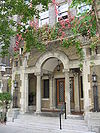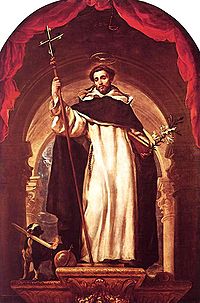
Dominican University College
Encyclopedia
The Dominican University College (formerly the Dominican College of Philosophy and Theology) is a bilingual Roman Catholic university in Ottawa, Ontario, offering civil and pontifical bachelor's, master's, and doctoral
Doctorate
A doctorate is an academic degree or professional degree that in most countries refers to a class of degrees which qualify the holder to teach in a specific field, A doctorate is an academic degree or professional degree that in most countries refers to a class of degrees which qualify the holder...
degrees in philosophy and theology. Its name in French is Collège universitaire dominicain.
Mission
- to provide students with a first class, bilingual education in philosophyPhilosophyPhilosophy is the study of general and fundamental problems, such as those connected with existence, knowledge, values, reason, mind, and language. Philosophy is distinguished from other ways of addressing such problems by its critical, generally systematic approach and its reliance on rational...
and theologyTheologyTheology is the systematic and rational study of religion and its influences and of the nature of religious truths, or the learned profession acquired by completing specialized training in religious studies, usually at a university or school of divinity or seminary.-Definition:Augustine of Hippo...
, in the Dominican orderDominican OrderThe Order of Preachers , after the 15th century more commonly known as the Dominican Order or Dominicans, is a Catholic religious order founded by Saint Dominic and approved by Pope Honorius III on 22 December 1216 in France...
tradition of intellectual excellence, free inquiryInquiryAn inquiry is any process that has the aim of augmenting knowledge, resolving doubt, or solving a problem. A theory of inquiry is an account of the various types of inquiry and a treatment of the ways that each type of inquiry achieves its aim.-Deduction:...
, and spiritual growth. - to contribute to the advancement of knowledge through a wide range of researchResearchResearch can be defined as the scientific search for knowledge, or as any systematic investigation, to establish novel facts, solve new or existing problems, prove new ideas, or develop new theories, usually using a scientific method...
activities. - to serve the societySocietyA society, or a human society, is a group of people related to each other through persistent relations, or a large social grouping sharing the same geographical or virtual territory, subject to the same political authority and dominant cultural expectations...
and various social organization, by forming students in critical thinkingCritical thinkingCritical thinking is the process or method of thinking that questions assumptions. It is a way of deciding whether a claim is true, false, or sometimes true and sometimes false, or partly true and partly false. The origins of critical thinking can be traced in Western thought to the Socratic...
, intelligence of faithFaithFaith is confidence or trust in a person or thing, or a belief that is not based on proof. In religion, faith is a belief in a transcendent reality, a religious teacher, a set of teachings or a Supreme Being. Generally speaking, it is offered as a means by which the truth of the proposition,...
, ecumenismEcumenismEcumenism or oecumenism mainly refers to initiatives aimed at greater Christian unity or cooperation. It is used predominantly by and with reference to Christian denominations and Christian Churches separated by doctrine, history, and practice...
, ethicsEthicsEthics, also known as moral philosophy, is a branch of philosophy that addresses questions about morality—that is, concepts such as good and evil, right and wrong, virtue and vice, justice and crime, etc.Major branches of ethics include:...
, and aestheticsAestheticsAesthetics is a branch of philosophy dealing with the nature of beauty, art, and taste, and with the creation and appreciation of beauty. It is more scientifically defined as the study of sensory or sensori-emotional values, sometimes called judgments of sentiment and taste...
.
Academics

- Between them, the Faculty of PhilosophyPhilosophyPhilosophy is the study of general and fundamental problems, such as those connected with existence, knowledge, values, reason, mind, and language. Philosophy is distinguished from other ways of addressing such problems by its critical, generally systematic approach and its reliance on rational...
and TheologyTheologyTheology is the systematic and rational study of religion and its influences and of the nature of religious truths, or the learned profession acquired by completing specialized training in religious studies, usually at a university or school of divinity or seminary.-Definition:Augustine of Hippo...
have about 80 full-time students each, for a total student body size of about 160.
Faculty of Philosophy
The Dominican University College offers a general education in philosophy, through the study of the principal schools of thought as well as major philosophical themes. Although the College is a Catholic institution, it is open to all schools of thought. Studies range from the Greek philosophers to Saint-Augustine and Saint-Thomas Aquinas, Descartes and Kant, and modern and post-modern philosophers,- Bachelor of Arts in Philosophy with Concentration in Ethics
- Bachelor of Arts with Concentration in Philosophy
- Bachelor of Arts with Honours in Philosophy
- Bachelor of Arts with Honours in Philosophy and Minor in Ethics
- Master of Arts in Philosophy
- Doctor in Philosophy
- Certificate in Philosophy
- Certificate in Applied Ethics (Philosophy)
Faculty of Theology
The undergraduate program in theological studies provides an overall view of the Christian Mystery. The three year Bachelors program has three major themes: God and the human being; Jesus Christ and the being-in-Christ; the Church and the Christian response.- Bachelor of Theology: civil and canonical degrees
- Masters of Arts in Theology
- Doctor in Theology
- Certificate in Theological Studies
- Certificate in Theology, Ethics and Health
- Continuing Education
History
- The teaching of PhilosophyPhilosophyPhilosophy is the study of general and fundamental problems, such as those connected with existence, knowledge, values, reason, mind, and language. Philosophy is distinguished from other ways of addressing such problems by its critical, generally systematic approach and its reliance on rational...
and TheologyTheologyTheology is the systematic and rational study of religion and its influences and of the nature of religious truths, or the learned profession acquired by completing specialized training in religious studies, usually at a university or school of divinity or seminary.-Definition:Augustine of Hippo...
has been a tradition for the DominicanDominican OrderThe Order of Preachers , after the 15th century more commonly known as the Dominican Order or Dominicans, is a Catholic religious order founded by Saint Dominic and approved by Pope Honorius III on 22 December 1216 in France...
order since the 13th century, but only in the past century have they been able to open the university up to the public and offer certified degrees.
Institut de pastorale des Dominicains

- L'Institut de pastorale des DominicainsInstitut de pastorale des DominicainsInstitut de pastorale des Dominicains is the Montreal, Quebec branch of the Dominican University College / Collège Universitaire Dominicain, a Roman Catholic university based in Ottawa, Ontario...
in Montreal offers, in French, programs in pastoral or liturgical theology or in catechism, leading to university certificates, bachelor's and master's degrees. - L'Institut was founded in 1960 in Montreal, Quebec by the Dominican OrderDominican OrderThe Order of Preachers , after the 15th century more commonly known as the Dominican Order or Dominicans, is a Catholic religious order founded by Saint Dominic and approved by Pope Honorius III on 22 December 1216 in France...
during the construction of the Convent Saint-Albert-le-Grand. L'Institut partnered with the Dominican College in Ottawa and acquired university status in 1967. - The Institute consists of 10 professors and two staff.
- The Director and registrar is Denis Gagnon.
- The motto is C'est l'université à taille humaine (It is the University with a human dimension)
Partnership
- The university is a member of the Association of Universities and Colleges of CanadaAssociation of Universities and Colleges of Canada- See also :* G13 * Association of Commonwealth Universities...
and of L'Association des universités de la francophonie canadienne, a network of academic institutions of the Canadian Francophonie.
See also
- Canadian government scientific research organizationsCanadian government scientific research organizationsExpenditures by federal and provincial organizations on scientific research and development accounted for about 10% of all such spending in Canada in 2006...
- Canadian industrial research and development organizationsCanadian industrial research and development organizationsExpenditures by Canadian corporations on research and development accounted for about 50% of all spending on scientific research and development in Canada in 2007....
- Canadian Interuniversity SportCanadian Interuniversity SportCanadian Interuniversity Sport is the national governing body of university sport in Canada, comprising the majority of degree granting universities in the country. Its equivalent body for organized sports at colleges in Canada is The Canadian Colleges Athletic Association...
- Canadian university scientific research organizationsCanadian university scientific research organizationsExpenditures by Canadian universities on scientific research and development accounted for about 40% of all spending on scientific research and development in Canada in 2006....
- Higher education in OntarioHigher education in OntarioHigher education in Ontario includes postsecondary education and skills training regulated by the Ministry of Training, Colleges, and Universities and provided by universities, colleges of applied arts and technology, and private career colleges. The current minister is Glen Murray who assumed the...
- List of colleges and universities named after people
- List of Ontario Universities
- Ontario Student Assistance ProgramOntario Student Assistance ProgramThe Ontario Student Assistance Program is a financial aid program delivered by the government of Ontario, Canada, for post-secondary education students...

